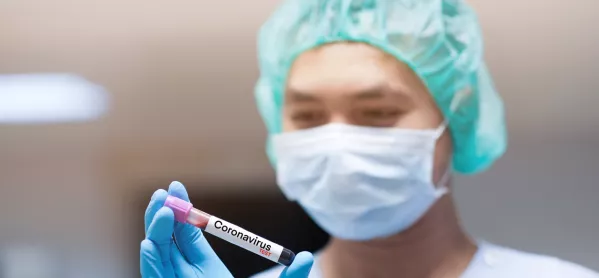It will be “important” to reach a “vastly increased” testing capacity by the time children return to school, an expert in infectious disease has said.
We have “every reason to believe that children can infect others”, even if they are asymptomatic, and should “take that seriously”, according to Professor Peter Drobac from the University of Oxford.
Professor Drobac, who specialises in infectious disease and has a background in paediatrics, told the BBC News channel that it will be important to have a “vastly increased capacity to test, and to trace contacts, and to isolate both children and adults” when schools return.
Coronavirus: Open schools ‘would increase infection’. But how much?
Related: Williamson rules out summer holiday school opening
Daily briefing: School social distancing ‘difficult’, admits deputy CMO
He also said schools should reopen in a “modified way”, to allow for “some measure of physical distancing”.
Professor Drobac warned that, even if children are asymptomatic, they can still transmit the disease.
“We know that they can be infected, and if they’re harbouring the virus they should be infectious,” he said.
“And we know that asymptomatic transmission - infected people without symptoms transmitting it to others - is a very significant driver of this pandemic.
“So, at this stage, we should have every reason to believe that children can infect others, and should take that seriously.”
Asked how this information should feed into any decision about the way in which schools should reopen, Professor Drobac said: “When we talk about returning to school, returning to work, returning to any semblance of normal activity, it’s all going to need to be in a modified way that’s going to allow for some measure of physical distancing. And so I think that’s going to be important for children as well.
“The other thing that this highlights is how important it’s going to be for us to have a vastly increased capacity to test, and to trace contacts, and to isolate both children and adults.
“If we’re wanting to get children back into school - and of course everyone agrees that’s an urgent priority - it’s going to be important to have the capability to test children and also to trace contacts.”
Yesterday, education secretary Gavin Williamson said he expects schools to reopen in a “phased manner”.
But a Chinese and US study published today in medical journal The Lancet suggests that reopening schools may risk sparking a second wave of the virus, as children and adults are equally likely to be infected.
Simon Clarke, professor in cellular microbiology at the University of Reading, told The Times: “This is an important paper. It means we should be extremely careful.
“As children are carriers, reopening schools could expose parents, grandparents and teachers to infection and in turn anyone they might come into contact with...risking a second wave.”
A Department for Education spokesperson said: “Education secretary Gavin Williamson has not set a date for schools reopening.
“They will remain closed, except for children of critical workers and vulnerable children, until the scientific advice indicates it is the right time to reopen and we have met the five tests set out by government to beat this virus.
“We are also working in close consultation with the sector as we consider how to reopen schools, nurseries and colleges when the time is right, and will ensure everyone has sufficient notice to plan and prepare.”





